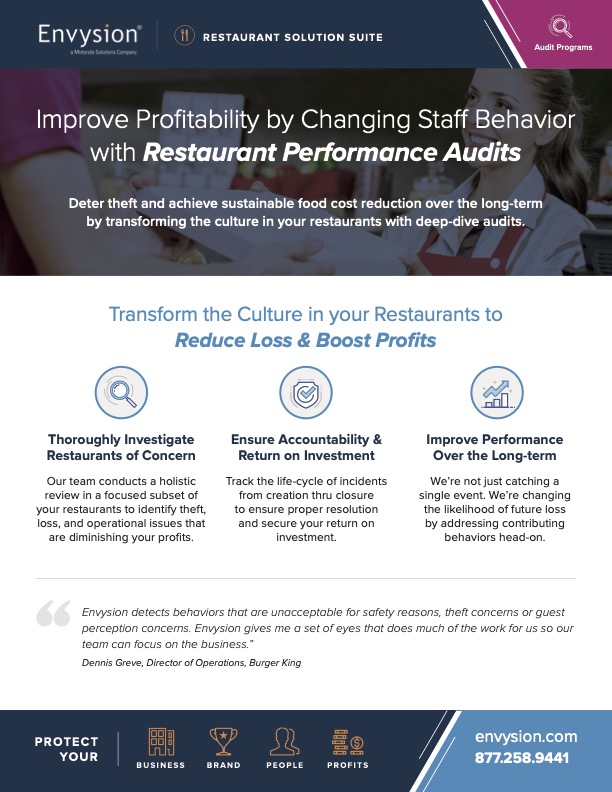As a restaurant owner or manager, you likely don’t have the time or resources to audit your restaurant 24 hours a day, 7 days a week. As operators are typically responsible for overseeing all aspects of their restaurant, the workload can be overwhelming, leaving little time for anything else. Hiring additional staff to monitor the business at all hours can also be costly, making it less cost-effective for many restaurants that already operate with limited staff. All these factors make it challenging for restaurant operators to have eyes on their business 24/7. While they may strive to keep a close watch on their business, they face many obstacles that can prevent them from doing so.
Restaurant audit programs are designed to ensure your business is being carefully monitored, even when you’re not able to. Integrating expert audit programs into your restaurant assists in ensuring your employees adhere to protocol regarding cash handling, internal theft, safety, cleanliness, and operational standards, which is vital to delivering outstanding customer experiences and maintaining loyalty. These programs involve a systematic review of the restaurant’s procedures, policies, and practices to ensure that they comply with industry standards and regulations. There are two types of audit programs: mystery shoppers and video security audits.
What are QSR Mystery Shopper Programs?
QSR mystery shoppers, or secret shoppers, are individuals tasked with visiting quick service restaurant locations and evaluating various aspects of the customer experience, including the quality of food, the cleanliness of the facilities, the speed of service, and the overall satisfaction of the customer. The purpose of mystery shoppers is to provide an objective evaluation of a restaurant’s performance from the perspective of a typical customer and to identify areas where the restaurant may be falling short in terms of customer service or experience.
Restaurant secret shoppers are typically trained to observe and record details about their interactions with restaurant employees, the appearance and maintenance of the restaurant, and the overall dining experience. The feedback and evaluations provided by the secret shoppers are used by restaurant management to identify areas for coaching, training, and improvement of the customer experience.
What are QSR Audit Programs?
In a QSR, audits are systematic and analytical assessments conducted to evaluate the efficiency and compliance of a restaurant’s operations and procedures with the established standards, policies, and regulations. The purpose of audits in a QSR is to identify areas for improvement, measure the restaurant’s performance, and ensure that required standards are being met. There are two types of audits: manual and machine-based audits. These audits are typically combined with your security cameras and/or your point-of-sale (POS) transaction data.
Manual Audits
Manual audits, or human-based audits, are performed by people who watch and evaluate that the restaurants and their employees are meeting the pre-determined set standards. These audits rely on auditors’ expertise and evaluation skills to manually validate evidence, pinpoint any vulnerabilities, and conduct in-depth examinations of a restaurant’s transactions and procedures.
Machine-Based Audits
Machine-based restaurant audits are audits performed by using artificial intelligence (AI) technology and automated systems to gather and analyze data, rather than relying on the manual review and analysis performed by auditors. Machine-based audits include the use of software to collect and analyze data related to food safety, inventory management, POS transactions, and employee and customer engagement.
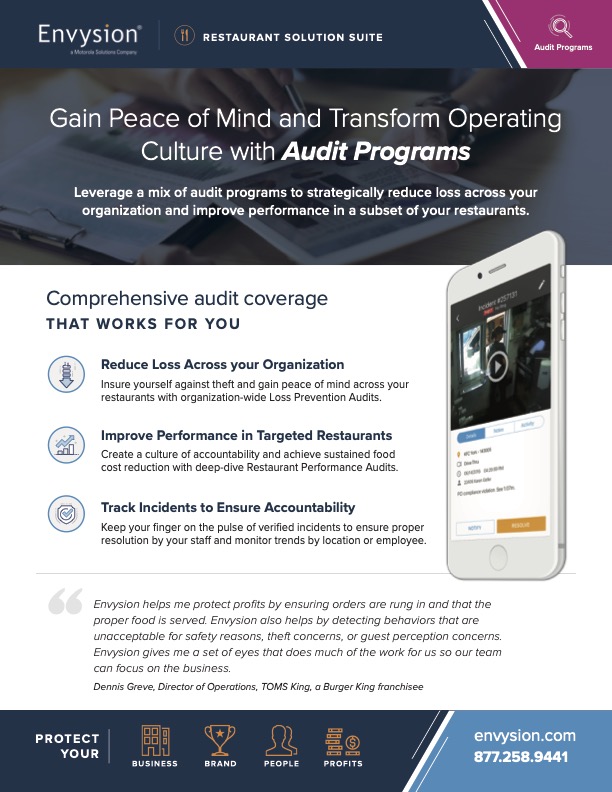

The promise of AI technology continues to grow. According to research by Accenture, the implementation of AI technologies in business is expected to increase human productivity by 40% by 2035. AI-based systems and machine learning can provide the tools to expedite and enhance the precision of audit processes.
Restaurant Audit Programs vs. Mystery Shopper Programs
QSR audit programs and mystery shopper programs are both used to evaluate and improve the customer experience in the restaurant industry, but they have different approaches and objectives. Both QSR audit programs and mystery shopper programs have their unique advantages, and they both come with some limitations. QSR audit programs can provide a more comprehensive evaluation of a restaurant’s operations, while a mystery shopper program provides more detailed feedback on specific aspects of the customer experience.
Although secret shoppers can provide valuable feedback, there are some drawbacks to using them. Firstly, their evaluations may be subjective, and secondly, they can be a more costly option. Additionally, there is a risk that employees may become aware of the presence of a secret shopper due to questions being asked or acting in a specific way, affecting the evaluation process.
However, mystery shoppers don’t require additional resources or technology tools. On the other hand, audit programs need security cameras, and in some cases, an integrated POS system to work effectively. Ultimately, a combination of both manual audits and machine-based audits can provide a more comprehensive assessment of a restaurant’s performance and help identify areas for improvement.
Audits Tailored to Fit your Restaurants’ Needs
#1. Restaurant Operations Audits
It’s imperative that your restaurant complies with safety procedures, maintains cleanliness in all areas, and follows customer service standards. While secret shoppers can only identify issues they observe (and employees may have excuses for any problems discovered), auditors and your security cameras offer a comprehensive view of the situation, rather than just a snapshot. To ensure that an audit program effectively assesses a restaurant’s operations, it should be customized to meet the restaurant’s specific needs. Additionally, expert auditors should be utilized to review a range of factors, such as:
- Cleanliness and Safety: In a restaurant, maintaining clean floors and countertops is crucial. Clean countertops are important in a restaurant to prevent the spread of harmful bacteria and ensure food safety. If floors are not cleaned according to proper protocol, it can create a hazard for customers who may slip and fall. Further, if there are wet floors, ensuring that wet floor signs and safety cones are being used correctly.
- Employee Misconduct: It’s important to ensure employees are following workplace safety measures. Areas such as employees not washing hands before handling food, smoking or vaping, cell phone use, and sitting on counters should be monitored closely.
- Opening and Closing of Restaurant: Auditing opening and closing procedures are an important aspect that involves verifying whether the restaurant is operating during the correct hours of business, following deep cleaning procedures, emptying food lines before closing, and other relevant tasks.
- Office: It’s crucial to check office use to prevent cash handling violations, ensure safes are closed, inappropriate behavior is not occurring, and doors are closed when the room is unattended.
- Uniform Compliance: Auditors evaluate employee uniform compliance by checking for hats, properly tied-up hair, safe shoes, and branded shirts. Uniform compliance is important in restaurants to maintain a professional appearance, promote hygiene and food safety, and provide a positive impression to customers.
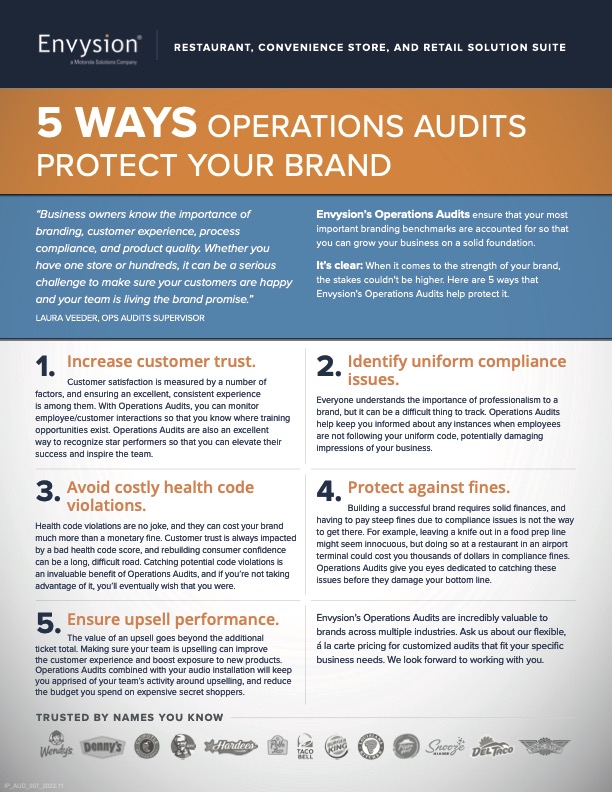
#2. Restaurant Performance Audits
It’s critical to identify and understand issues in your restaurant that are contributing to profit loss, food costs, and poor customer experience. Restaurant performance audits help to improve operational efficiency by identifying areas where processes can be streamlined and costs reduced. For instance, a common problem that can quickly add up is an employee handing out senior discounts to anyone who appears older than 40, which can result in significant financial losses for the company. In this situation, your performance audits can be used as a training and coaching tool to address problems and curb employee theft.
Trained auditors should perform a thorough investigation of your restaurant to identify theft, loss, and operational issues that are diminishing your profits. By monitoring the complete incident lifecycle, starting from its creation to the final outcome, you can be confident that a resolution has been achieved and be assured of the return on your investment. Auditors should not only be catching single events, but they should also be changing the likelihood of future theft and loss by addressing any contributing behaviors head-on. With restaurant performance audits, improve your restaurant by:
- Pinpointing issues in your underperforming restaurants to help you improve operations and increase profitability
- Transforming struggling restaurants into top performers by leveraging an analysis of theft, loss, and operational issues
- Comprehensively review your restaurants to identify theft, loss, and operational issues that are impacting your profits
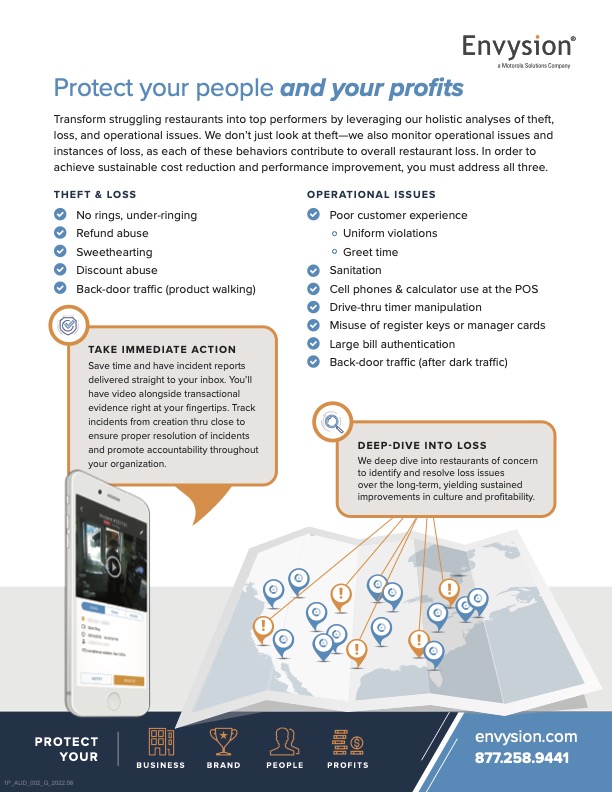
#3. Loss Prevention Audits
Loss prevention audits in restaurants are a comprehensive review of procedures and controls aimed at reducing the risk of financial loss due to theft, fraud, waste, and other inefficiencies. These audits primarily focus on cash handling and profit loss. By implementing this kind of audit program, you can identify weaknesses in procedures that
dishonest employees and other internal loss factors may exploit. Conducting regular loss prevention audits is essential to ensure the financial health and sustainability of your restaurant business.
This type of audit program combines your security cameras and POS data to identify actionable incidents that could affect your bottom line or hurt your brand, people, or profits. Once enough evidence is ga
thered, the incidents should be reported to you so you can take swift action to minimize further losses. With loss prevention audits, you can track transaction patterns like:
- No rings, under-ringing
- Product giveaways
- Refund abuse
- Discount abuse
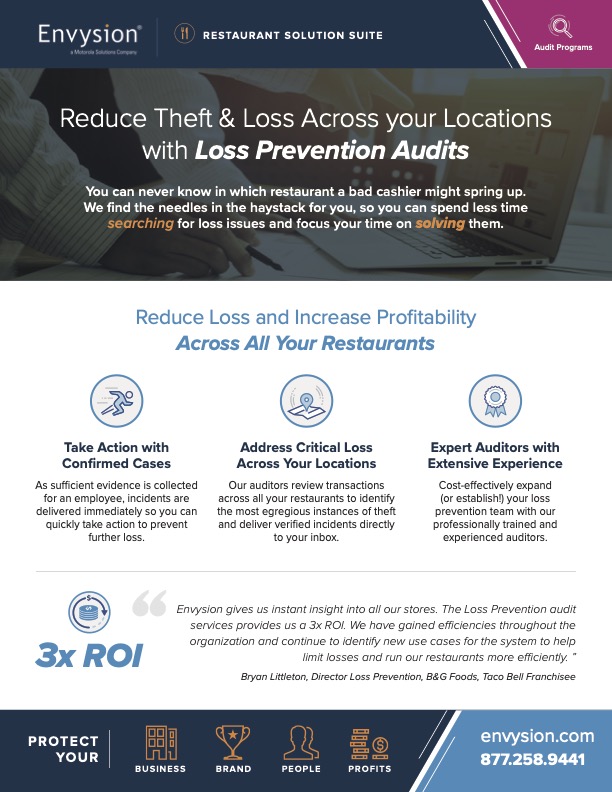
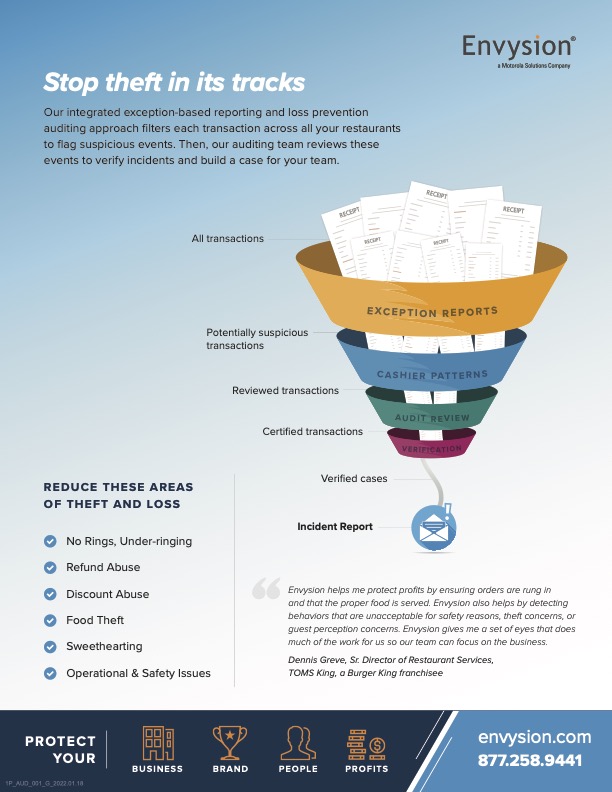
At Envysion, we provide both human-based and machine-based audits. Our audit programs are equipped with certified experts to watch for health and safety concerns, identify theft, fraud, and operational incidents by leveraging integrated video surveillance and transaction data.
As a restaurant owner or manager, ensuring the smooth and secure operation of your restaurant can be challenging. However, with the integration of expert audit programs into your restaurant, you can have the assurance that your employees are following standard protocols regarding safety, cleanliness, cash handling, and operational standards. By combining your security cameras, POS transaction data, and Envysion’s certified expert auditors, you can be assured that there are eyes on your restaurant’s activities around the clock. Having a well-monitored restaurant provides peace of mind for both you and your customers.
Ready to get more out of your restaurant’s video security? Talk to an expert today.

